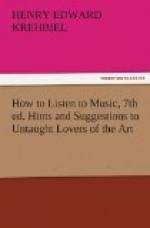In the intricacy of its mechanism the pianoforte stands next to the organ. The farther removed from direct utterance we are the more difficult is it to speak the true language of music. The violin player and the singer, and in a less degree the performers upon some of the wind instruments, are obliged to form the musical tone—which, in the case of the pianist, is latent in the instrument, ready to present itself in two of its attributes in answer to a simple pressure upon the key. The most unmusical person in the world can learn to produce a series of tones from a pianoforte which shall be as exact in pitch and as varied in dynamic force as can Mr. Paderewski. He cannot combine them so ingeniously nor imbue them with feeling, but in the simple matter of producing the tone with the attributes mentioned, he is on a level with the greatest virtuoso. Very different is the case of the musician who must exercise a distinctly musical gift in the simple evocation of the materials of music, like the violinist and singer, who both form and produce the tone. For them compensation flows from the circumstance that the tone thus formed and produced is naturally instinct with emotional life in a degree that the pianoforte tone knows nothing of.
[Sidenote: Technical manipulation.]
[Sidenote: Touch and emotionality.]
In one respect, it may be said that the mechanics of pianoforte playing represent a low plane of artistic activity, a fact which ought always to be remembered whenever the temptation is felt greatly to exalt the technique of the art; but it must also be borne in mind that the mechanical nature of simple tone production in pianoforte playing raises the value of the emotional quality which, nevertheless, stands at the command of the player. The emotional potency of the tone must come from the manner in which the blow is given to the string. Recognition of this fact has stimulated reflection, and this in turn has discovered methods by which temperament and emotionality may be made to express themselves as freely, convincingly, and spontaneously in pianoforte as in violin playing. If this were not so it would be impossible to explain the difference in the charm exerted by different virtuosi, for it has frequently happened that the best-equipped mechanician and the most intellectual player has been judged inferior as an artist to another whose gifts were of the soul rather than of the brains and fingers.
[Sidenote: The technical cult.]
[Sidenote: A low form of art.]
The feats accomplished by a pianoforte virtuoso in the mechanical department are of so extraordinary a nature that there need be small wonder at the wide prevalence of a distinctly technical cult. All who know the real nature and mission of music must condemn such a cult. It is a sign of a want of true appreciation to admire technique for technique’s sake. It is a mistaking of the outward shell for




